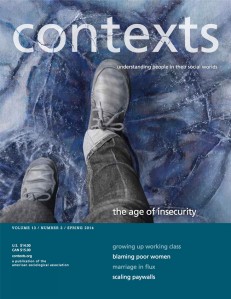
Spring 2014
Volume: 13 | Number: 2
Open Access
Librarian Jill Cirasella describes some problems with the traditional system of scholarly journal publishing and explains how scholars can make their works open access, or freely available online. She discusses some of the benefits of open access, as well as some of the challenges to achieving widespread openness. Read More
Ruling Out Rape
Five experts, Lisa Wade, Brian Sweeney, Amelia Seraphia Derr, Michael A. Messner, and Carol Burke, discuss how institutions deal with sexual assault and whether or not policies really protect victims. Read More
Aging Women, Living Poorer
Sociologist Stacy Torres examines why higher poverty rates persist among older women compared with older men and finds that women continue to face significant economic disadvantages in old age, partly due to a lifetime of unpaid, work-interrupting care giving responsibilities. Read More
Loving Across Racial Divides
Sociologist Amy C. Steinbugler examines the everyday lives of lesbian, gay, and heterosexual black/white couples. She shows that even as overt racial prejudice declines, racism continues to shape interracial lives through residential segregation, racial orientations, and racial-gender stereotypes. Read More
Working Class Growing Pains
Sociologist Jennifer M. Silva examines how working-class men and women navigate the transition to adulthood amid economic insecurity and social isolation. She finds that young adults experience fear of intimate relationships, low expectations of work, and widespread distrust of institutions as they come of age. Read More
Suffering In An Age Of Personal Responsibility
Drawing on more than five years of research with women who inhabit a circuit of suffering made up of prison, homeless shelters, drug programs and the streets, sociologist Susan Sered argues that punishment and treatment often function as two sides of the same coin: a coin that construes women's suffering in terms of their private traumas, personal flaws, and poor choices. This ideological script functions to blame the victim, obscure the structural causes of poverty and violence, and absolves governments from public responsibilities for the well-being of citizens. Read More
Black Brazil Never Slept
Analyzing the media coverage of the 2013 Brazil protests, sociologist Katherine Jensen uncovers that violence against white women became the rallying cry for popular political action, while black mobilization was depoliticized as violent chaos and violence against blacks was ignored. Read More
The Trouble With Tebowing
Sociologists Grace Yukich, Kimberly Stokes, and Daniela Bellows explore cultural norms around religious displays in sports, and in public life more generally, by examining media coverage of controversial football player Tim Tebow. Read More
Political Theater
Urban sociologist, Virág Molnár, reviews the books No Billionaire Left Behind and Thank You, Anarchy. The books examine satirical activism and Occupy Wall Street's mix of direct democracy and anarchism as examples of unconventional political protest in the contemporary United States. Read More
The Mediated Sociologist
Sociologist Karen Sternheimer considers the opportunities and challenges of presenting sociological concepts in the news media, particularly when our ideas are edited or interpreted by others. Read More
